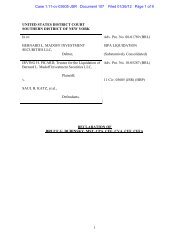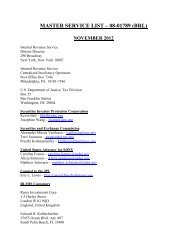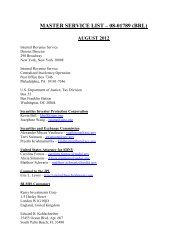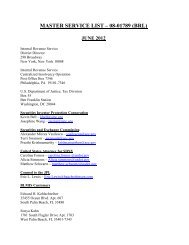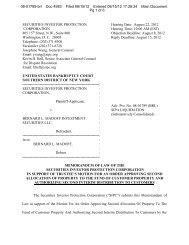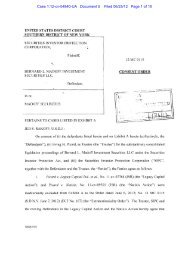BAKER & HOSTETLER LLP 45 Rockefeller Plaza New York, New ...
BAKER & HOSTETLER LLP 45 Rockefeller Plaza New York, New ...
BAKER & HOSTETLER LLP 45 Rockefeller Plaza New York, New ...
You also want an ePaper? Increase the reach of your titles
YUMPU automatically turns print PDFs into web optimized ePapers that Google loves.
10-04285-brl Doc 127 Filed 08/17/12 Entered 08/17/12 14:29:55 Main Document<br />
Pg 41 of 133<br />
estate while, on the other hand, denying the Court’s jurisdiction to adjudicate the estate’s<br />
avoidance action against it.<br />
2. Luxalpha’s Proposed Exceptions to the Rule Regarding Claims Do<br />
Not Apply<br />
In addition to admitting to its shareholders that filing a claim subjects the claimant to the<br />
jurisdiction of this Court, Luxalpha acknowledges in its brief that filing a claim normally<br />
constitutes consent to jurisdiction, but Luxalpha asserts that there are exceptions to this rule if a<br />
creditor: (1) contests jurisdiction prior to filing the claim, or (2) files the claim for defensive<br />
reasons. (Luxalpha Mot. at 6–8.) These arguments are unavailing.<br />
The first purported exception is inapplicable because Luxalpha does not assert that it<br />
contested to jurisdiction prior to filing its two claims in March 2009. 10 (See Luxalpha Mot. at 6–<br />
8.) The second purported exception, that a claim is not a submission to jurisdiction if it is filed<br />
for “defensive reasons,” is also inapplicable. Luxalpha depends on In re Kirchoff Frozen Foods,<br />
Inc. as support for this contention. 11 See Dexter v. Gilbert (In re Kirchoff Frozen Foods, Inc.),<br />
496 F.2d 84 (9th Cir. 1974). Luxalpha argues that its claims were “defensive” like those in<br />
Kirchoff because its claims were filed to limit liability to Luxalpha’s investors. 12 (Luxalpha Mot.<br />
at 7–8.) Unlike the purported creditor in Kirchoff, however, Luxalpha did not file its claims after<br />
10 Consequently, Luxalpha’s reliance on In re Castlerock Properties is misplaced. See Piombo Corp. v. Castlerock<br />
Props. (In re Castlerock Props.), 781 F.2d 159, 161 (9th Cir. 1986). In that case, the debtor asserted state law<br />
claims against the creditor before that creditor had filed a proof of claim. The creditor objected to the bankruptcy<br />
court’s jurisdiction and filed a proof of secured claim only after the bankruptcy court had denied that objection. Id.<br />
at 162–63. On appeal, the court held that the creditor had not evidenced its consent to jurisdiction because the<br />
creditor would not have filed the claim had the bankruptcy court declined jurisdiction. Id.<br />
11 Luxalpha also cites In re PNP Holdings Corp., a case in which the court acknowledges the holding in Kirchoff but<br />
ultimately holds that the defendant consented to personal jurisdiction by filing a claim. Tucker Plastics, Inc. v. Pay<br />
‘N Pak Stores, Inc. (In re PNP Holdings Corp.), 184 B.R. 805, 807 (B.A.P. 9th Cir. 1995).<br />
12 Luxalpha also argues that it did not consent to jurisdiction because UBS employees filed Luxalpha’s customer<br />
claims. But it is undisputed that Moving Luxalpha Director Defendants Schroeter and Hondequin signed Claim<br />
Nos. 4419 and 5725 in Luxalpha’s name for Luxalpha’s BLMIS account, and that these claims belong to Luxalpha.<br />
(See Pergament Decl. Exs. 20, 21.)<br />
21



